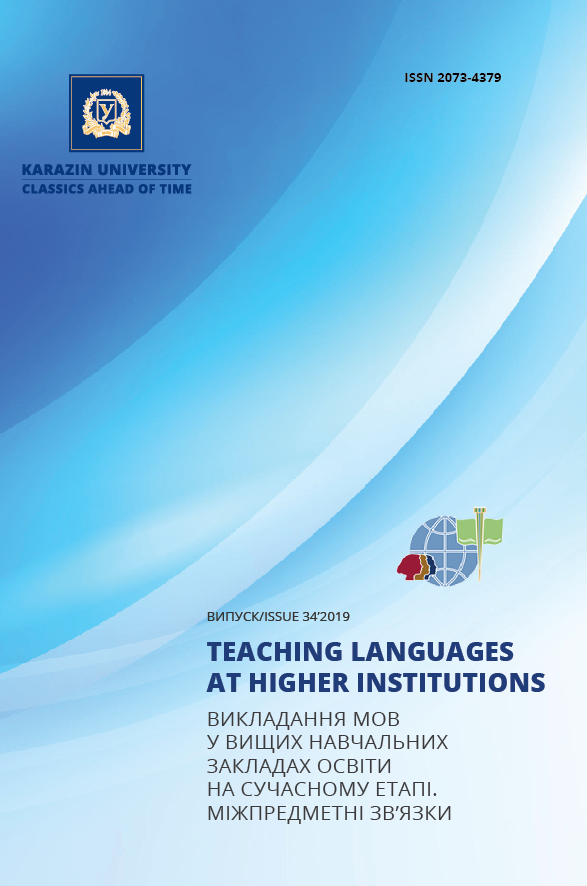Сlassification description and exercise system in training foreign students a speciality language (levels A2 B1, B1+)
Abstract
Existing systems of exercises on the communicative competence formation of foreign students, learning Russian, have been considered in this article. Different approaches to the exercise classification system have been suggested. A new approach to the selection and presentation of basic learning tools (exercises), included into the educational process of the Preparatory Faculty (level A-2, B-1), for language acquisition speciality has been proposed. The article is based on the Prof. D. Izarenkov Scientific School concept. He proved that exercise apparatus combined a great number of exercises in a special system. Classification is based on the basis of 3 distinctive indications: operational content of the speech activity; unites of training; content of intellectual side of the speech activity in the process of doing exercises. This classification has some advantages in comparison with the others. It includes a great variety of exercises and remains at the same time an open system. It opens some possibilities to choice the necessary exercises in the frame of the method of teaching. System of exercises is represented in the form of exercise microsystem. Actuality and perspectives of the proposed selection and possibility to use it for creation of text-books for foreign students have been proved. System description of the exercise apparatus may be perspective for the researchers and for the teachers, who control practical work with the students. Descriptions of different teaching aids, proposed by different educational institutes, have been presented. Conclusions about using different classifications have been made. Authors believe, that traditional classifications can be used in the formation of exercises system in the work with different levels of students as well as post-graduate students. Different examples of text-books construction, using the existing exercise systems, have been also described.
Downloads
References
Borisova, L.N. and Dubinina, L.L. (2017). Jazuk specialnosti. Mediko-biologicheskiy profil. Nachalnuy etap: ucheb. posobie po russkomu yazuku dlya inostrannuh uchaschihcya [Professional language. Medico-biological profile. Elementary. Textbook in Russian Language for foreign students]. Moscow: MAHI [in Russian].
Borisova, L.N. (2013). Nauchnyi stil rechi: medico-biologicheskiy profil (basovyi (A2, pervyi (B1) uroven [Scientific style of speech: medico-biological profile (basic (A2), first (B1 level)]. Belgorod: “BelSU” [in Russian].
Dorzhieva, S.B. and Tumakova, N.A. (2015). Sistema uprazhneniy dlja razvitija umeniy dialogocheskoy rechi: obzchaja haracteristika [System of exercises for developing dialogic: general characteristics]. Molodoy uchenyi [Young scientist]. Moscow, 11, pp. 1340–1342 [in Russian].
Dubinina, L.L. (2014). Osnovnye funkcionalnye raznovidnosti specialnyh uchebnyh tecstov [Basic functional varieties of special texts]. Mezhdunarodnoe obrazovanie i sotrudnichestvo [International education and progress]. Moscow, pp. 20–26 [in Russian].
Dubinina, L.L. (2014). Raznovidnosti monologicheskih vyskazuvaniy na materiael specialnyh uchebnyh tekstov i kompleksy zadaniy po formirovaniju umeniu ih producirovanija [Varieties of monologues on the material of special texts and tasks complex in formation skills of their production]. Mezhdunarodnoe obrazovanie i sotrudnichestv [International education and progress]. Moscow, pp. 20–26 [in Russian].
Izarenkov, D.I. (1993). Metatemnyy podhod k otboru i opisanijy predmetnogo komponenta kommunikativnoi kompetencii [Metatheme approach to selection and description of the communicative competence subject component]. Osnovnue tendencii v organizacii i soderzhanii uchebnogo processa na nachalnom i srednem etapah [Basic tendencies in organization and content of educational process at the elementary and intermediate stages]. Moscow: RUP, pp.77–85 [in Russian].
Izarenkov, D.I. (1994). Apparat uprazhneniy v cictemnom opicanii [Exercises apparatus in the system description]. Russkiy yazuk za rubezhom [Russian language adroad]. Moscow, 1, pp.77–85 [in Russian].
Izarenkov, D.I. (1995). Lingvametodicheskja interpretacia uchebnogo teksta [Linguamethodical interpretation of the text]. Russkiy yazuk za rubezhom [Russian language adroad]. Moscow, 1, pp. 55–62 [in Russian].
Lapidus, B.A. (1979). Tipologija uprazhneniy diskussija prodolzhaetcja Inostrannye yazyki v vysshey shkole. [Foreign languages in high school]. Moscow, pp. 24–38 [in Russian].
Mirolyubov, A.A. (1973). Razrabotka teoreticheskih voprosov sistemu uprazhneniy v sovetskoy metodike obuchenija inostrannum jazukam [Developing of theoretical issues of the exercises system in soviet methods of teaching foreign languages]. Actualnue voprosu obucheniya inostrannum yazukam v shkole [Actual issues of teaching foreign languages at school]. Moscow [in Russian].
Motina, E.I. (1988). Jazuk i specialnost: lingvisticheskie osnovy obuchenija russkomu jazuku studentov-nefilologov [Language and speciality: linguistic basics of teaching Russian for non-philologists]. Moscow, pp. 36–58 [in Russian].
Muhammad, L.P. (2003). Integrativnaja model obuchenija receptivyum vidam rechevoi dejatelnosti studentov-nefilologov (nachalnyy i sredniy etapy obuchenija) [Intergartive Model of teaching receprive types of speech activity non philologists (initial and middle stages of study)]. Extended abstract of candidate’s thesis. Moscow [in Russian].
Passov, E.I. (1989). Osnovy kommunikativnoy metodiki obuchenija inojazuchnomu obscheniju [Basics of communicative methods of teaching foreign language communication]. Moscow. [in Russian].
Passov, E.I. (2010). Osnovy kommunikativnoi teoriii i technologii inojazuchnogoj: metodicheskoe posobie dlja prepodavanteley russkogo jazuka kak inostrannogo [Basics of communicative theory and technologies of foreign education: methodological textbook for teachers of Russian language as a foreign one]. Moscow: Russian language. Courses [in Russian].
Rahmanov, I.V. (1956). Metodika obuchenija nemeckomu jazukuin VIII–X classah [Methods of teaching German language at VIII–X classes]. Moscow [in Russian].
Ushakova, N.I., Alekseenko, T.N., Klochko, T.V., Kushnir, I.N. and Petrenko, I.P. (2016). Parallel. Russkiy jazyk dlja nachinajuschih. Osnovnoy kurs [Parallel. Russian language for beginners. Basic course]. Kharkiv: V.N. Karazin Kharkiv National University [in Russian].
Vishnevskiy, E.I. (1983). Apparat uprazhneniy v svete raznuh podhodov k obucheniju inostrannumj yazukam [Apparatus of exercises in the light of different approaches to teach foreign languages]. [Foreign languages in high school]. Moscow, 6, pp. 58–63 [in Russian].

